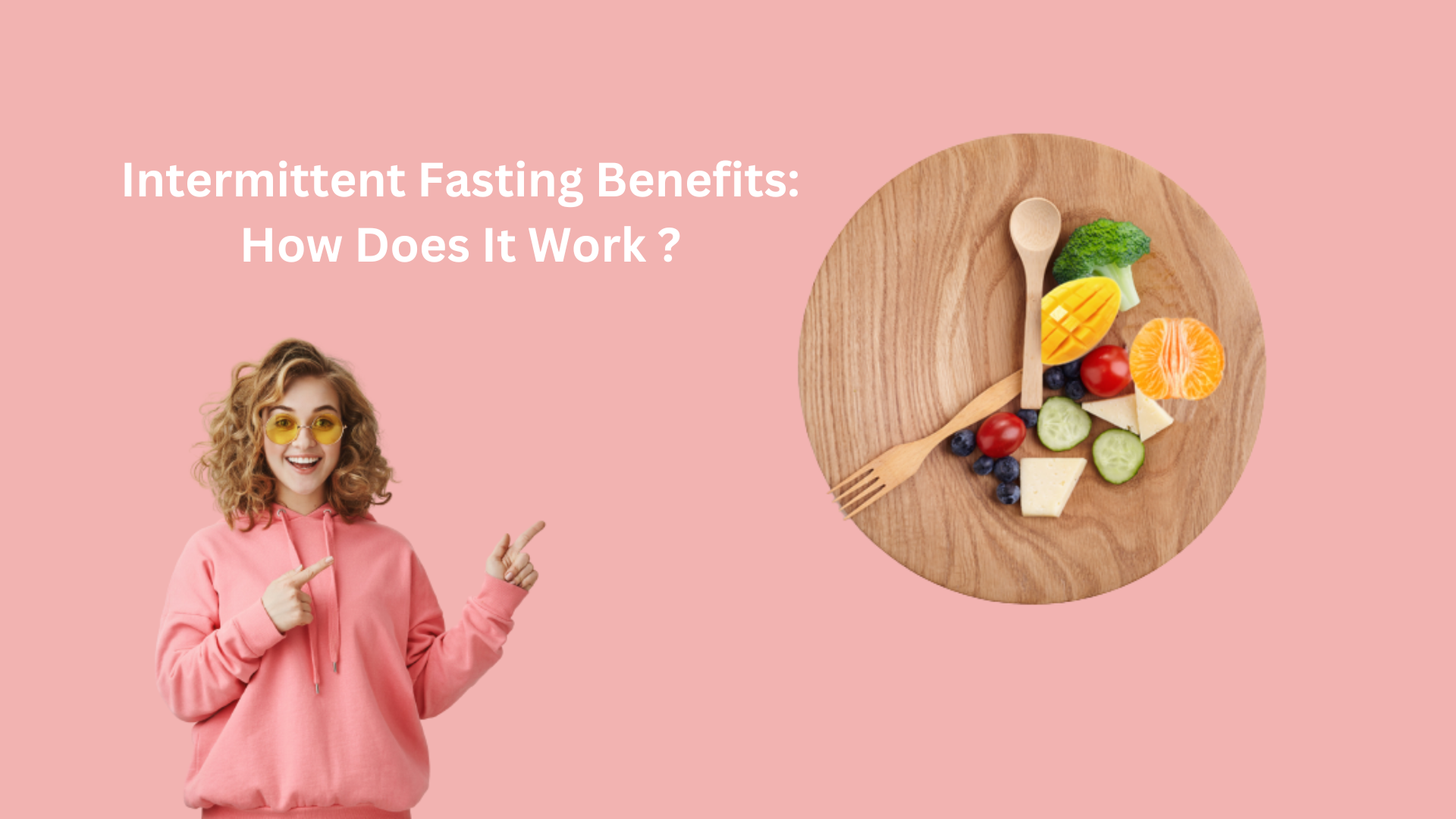Intermittent Fasting Benefits? Intermittent fasting (IF) is a popular dietary strategy that involves periods of fasting and eating. This eating pattern has been found to have numerous health benefits, including weight loss, improved blood sugar control, and decreased inflammation. In this article, we will explore the science behind intermittent fasting and how it can benefit our health.
What is Intermittent Fasting?
Intermittent Fasting is not a diet, but rather an eating pattern. It involves alternating periods of eating and fasting.
How Does Intermittent Fasting Work?
When we eat, our bodies break down carbohydrates into glucose, which is used as energy. Insulin, a hormone produced by the pancreas, helps to regulate blood sugar levels by moving glucose from the bloodstream into our cells. Excess glucose is stored in the liver and muscles as glycogen.
During periods of fasting, our bodies use up the stored glycogen for energy. When glycogen stores are depleted, our bodies start to break down fat for energy. This process, called ketosis, results in the production of ketones, which can be used as an alternative source of fuel.
Intermittent fasting also triggers several cellular processes that can improve our health. For example, fasting has been found to increase autophagy, a process by which our bodies break down and recycle damaged cells. This helps to remove toxins and promote cellular renewal.
Fasting also activates genes that are involved in stress resistance and longevity. Studies have found that intermittent fasting can increase lifespan and delay the onset of age-related diseases.
several different methods of intermittent fasting, but the most common are as follows
16/8 method:
This is the most common method of intermittent fasting. This involves eating only during an 8-hour window and fasting for the remaining 16 hours. The 16/8 method of intermittent fasting involves restricting your daily eating window to 8 hours and fasting for the remaining 16 hours. This is the best way to reduce weight.
For example, if you begin eating at noon, you would stop eating by 8 pm and fast until noon the next day. During the 8-hour eating window, you can consume 2-3 meals, depending on your caloric needs. during the fasting period, you can take zero calories like green tea without sugar.
The 16/8 method is famous because it is easy to follow and can fit into most people’s schedules. Nowadays many actors are following this method to reduce their weight instantly also Many individuals choose to skip breakfast and eat their first meal around noon, while some people prefer to have an early dinner and fast through the night so they can easily complete the fasting period.
Advantages of the 16/8 method
include weight loss, improved insulin sensitivity, and reduced inflammation. It can also be a sustainable way to maintain a healthy weight and promote overall wellness. However, it is not suitable for everyone, particularly those with certain medical conditions or who are pregnant or breastfeeding. Before starting intermittent fasting we should always speak to our health care provider.
5:2 method:
This method of intermittent is also known as a fast diet during this period we eat normally for five days and restrict calorie intake to 500 /600 for two days.
For example, on Wednesday and Thursday, you would limit your calorie intake to 500-600 calories while eating normally on the other five days. During the 2 days of calorie restriction, it’s important to choose nutrient-dense foods and avoid overeating during the non-fasting days.5.2 method can also be a flexible way to incorporate fasting into your lifestyle, as the two fasting days can be scheduled according to your preference.
Advantages
Weight loss Many people use the 5:2 method to help them lose weight. By restricting calories for two days a week, you may naturally consume fewer calories overall, leading to weight loss over time. Flexibility: The 5:2 method can be relatively
easy to incorporate into your weekly routine since you can choose which two days you want to restrict your calories. Improved blood sugar control: Some studies have suggested that intermittent fasting can improve insulin sensitivity and blood sugar control, which may be beneficial for people with diabetes.
Disadvantages
Hunger Restricting calories to just 500-600 per day can be challenging,
and some people may feel very hungry on the two fasting days.
Nutrient deficiencies: Eating such a low amount of calories on the two fasting days may make it difficult to consume all the necessary nutrients your body needs, particularly if you don’t choose nutrient-dense foods.
Not suitable for everyone: Intermittent fasting, including the 5:2 method, may not be suitable for everyone. It’s important to speak with a healthcare provider before starting any new diet or fasting plan, particularly
if you have a medical condition or take certain medications.
Overall, the 5:2 method of intermittent fasting can be an effective way to lose weight and improve blood sugar control for some people. However, it’s important to consider both the advantages and disadvantages before deciding if it’s the right fasting method for you.
Eat-stop-eat method: Stop-Eat is a form of intermittent fasting that involves fasting for a full 24-hour period once or twice per week. During the fasting period, no food or caloric beverages are consumed. Once the fast is complete, normal eating patterns are resumed. This approach is meant to create a caloric deficit, which can lead to weight loss and other health benefits such as
Improved insulin sensitivity: Intermittent fasting has been shown to improve insulin sensitivity,
which can help regulate blood sugar levels and prevent type 2 diabetes.
Increased growth hormone: Intermittent fasting has been shown to
increase growth hormone levels, which can aid in fat loss and muscle gain.
Improved mental clarity: Some people report feeling more focused and clear-headed during their fasting periods.
Convenience: The Eat-Stop-Eat method may be convenient for people who prefer to fast for longer periods rather than restricting their calories every day
How does the Eat-Stop-Eat method work?
The Eat-Stop-Eat method works by creating a caloric deficit. By fasting for a full 24-hour period, individuals can reduce their overall caloric intake for the week. This can lead to weight loss and other health benefits.
During the fasting period, the body switches from using glucose for energy to using stored fat instead. This process is known as ketosis. While in ketosis, the body can burn fat for energy, which can result in weight loss.Intermittent Fasting Benefits
On fasting days, you consume very few calories – typically around 500-600 – while on non-fasting days, you eat normally. fasting days, you can consume around 500-600 calories, usually in the form of one or two small meals. On non-fasting days, you can eat normally, but it’s important not to overcompensate and eat too many calories. Advantages ADF can lead to weight loss by creating a calorie deficit. By reducing the number of calories consumed every other day, you may naturally consume fewer calories, leading to weight loss.
Improved insulin sensitivity: ADF has been shown to improve insulin sensitivity, which can help regulate blood sugar levels and prevent type 2 diabetes.
Improved heart health: ADF has been associated with improvements in blood pressure, cholesterol levels, and markers of inflammation, all of which are risk factors for heart disease.
Reduced cancer risk: ADF has been shown to reduce the risk of certain types of cancer, including breast cancer and colon cancer.
Convenience: ADF may be more convenient for some people than other types of intermittent fasting, as it involves only one day of fasting per week
What benefits of Intermittent Fasting?
Weight Loss
Intermittent fasting can be an effective tool for weight loss. By reducing calorie intake, intermittent fasting can create a calorie deficit, which is necessary for weight loss. Studies have found that intermittent fasting can lead to significant reductions in body weight, body fat, and waist circumference.
Improved Blood Sugar Control
Intermittent fasting has been found to improve blood sugar control and insulin sensitivity. By reducing calorie intake and improving insulin sensitivity, intermittent fasting can help to prevent or manage type 2 diabetes.
Reduced Inflammation
Intermittent fasting has been found to reduce inflammation, which is a risk factor for many chronic diseases, including heart disease, cancer, and Alzheimer’s disease. By reducing inflammation, intermittent fasting can help to promote overall health and prevent disease.Intermittent Fasting Benefits
Improved Heart Health
Intermittent fasting can improve several risk factors for heart disease, including blood pressure, cholesterol levels, and triglycerides. By reducing these risk factors, intermittent fasting can help to improve heart health and reduce the risk of heart disease.Intermittent Fasting Benefits
Improved Brain Function
Intermittent fasting has been found to improve cognitive function and brain health. By promoting neurogenesis, or the growth of new brain cells, intermittent fasting can help to improve memory and learning ability.
Intermittent fasting is not suitable for everyone
However, it’s important to note that intermittent fasting may not be suitable for everyone. Pregnant women, individuals with a history of eating disorders, and those with certain medical conditions should avoid them. Intermittent fasting can have both positive and negative side effects. Here are some potential negative side effects of intermittent fasting:
Hunger: During fasting periods, some people may experience hunger, which can be uncomfortable or distracting.
Fatigue: Some people may experience fatigue or low energy during fasting periods, particularly when starting a new fasting routine.
Headaches: Headaches may occur during fasting periods, particularly in the first few days of starting a new fasting routine.
Irritability: Some people may experience irritability or mood changes during fasting periods.
Difficulty sleeping: Fasting can disrupt sleep patterns in some people, particularly if they are hungry or experiencing caffeine withdrawal.
Nutrient deficiencies: If you’re not consuming enough calories or a variety of nutrients during eating periods, you may be at risk of nutrient deficiencies.
Dehydration: Fasting can lead to dehydration if you’re not drinking enough fluids during the fasting periods.



